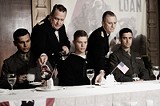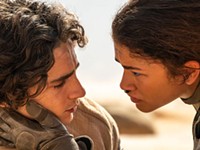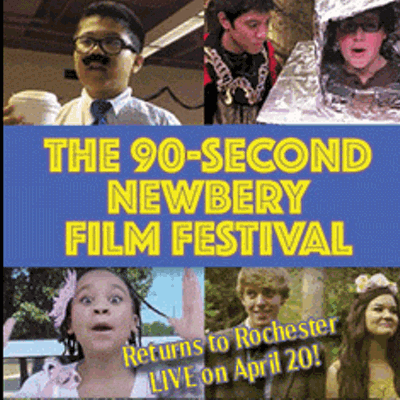"Flags of Our Fathers"
A WWII drama that explores on the other side of the thin red line
By George Grella[
{
"name": "500x250 Ad",
"insertPoint": "5",
"component": "15667920",
"parentWrapperClass": "",
"requiredCountToDisplay": "1"
}
]
The war in the Pacific, and at home
Movies
Whether because of public dubiety about all the conflicts since World War II, a willingness to exploit any trend, or perhaps the inexorable progress of history itself, Hollywood continues to produce movies about the last truly global conflict, "the Good War." Despite its soppy weepiness, The Thin Red Line, about a battle for a Pacific island, earned positive reviews, if slender profits. More important, Saving Private Ryan won numerous awards, including medals from the armed services for its director and star. (I wonder how many of those young men who fought, suffered wounds, or died on D-Day won such prestigious commendations?)
Now Clint Eastwood's new film, Flags of Our Fathers, confronts one of the costliest battles of the war, the attack on Iwo Jima, a dreary, obscure island in the Pacific regarded as necessary for staging American air attacks and saving crippled aircraft and wounded crewmen. In a pseudo-documentary style, Eastwood shows the familiar scenes of Marines learning about their mission, the various preparations of the men who will fight the Japanese on that lunar landscape against heavy guns, strong fortifications, and a fierce fighting force entrenched for many years. Nobody could have predicted the ferocity and horror of that battle.
Unlike most war movies, including the John Wayne classic Sands of Iwo Jima, the picture focuses mostly on the home front, especially on the three survivors of the group that raised the flag on Mount Suribachi in 1945. Snapped by Joe Rosenthal, the picture of the event became the most famous photograph of World War II, and in effect, the real basis of Flags of Our Fathers. The government brings the three men, John "Doc" Bradley (Ryan Phillippe), a Navy medical corpsman, and two Marines, Rene Gagnon (Jesse Bradford) and Ira Hayes (Adam Beach), back for a series of great public appearances in order to increase war bond sales and inspire greater patriotism in the folks on the home front.
Almost as soon as they arrive, the men learn that the government has no interest in the facts of the situation --- because a big shot wanted the first as a souvenir, the picture actually shows the second flag on Iwo Jima --- but simply wants to exploit them as returning heroes. In reality, they find themselves uncomfortable with their role, since they know that like any men in combat, they fought as much from fear and allegiance to their fellows as any particular heroism. As they point out, the battle for Iwo Jima continued for more than a month after the flagraising, and that a good many of their friends and comrades never returned from that bleak place.
The reality of course fails to convince the people running the bond tour, who take the three all over the country, so that cheering throngs in great arenas can watch some fake re-enactment of the flagraising and the local politicians and businessmen can bask in their reflected glory. A number of individual flashbacks to their experiences on Iwo Jima contrast with the smug ignorance of the civilians who cannot or will not understand the truth of the historic event, of war itself. The distinction between their knowledge and the public belief finally unhinges Ira Hayes, certainly the best known of the three, whose sad story of anger, frustration, and a retreat into alcoholism has been told before.
In its careful attention to the lives of these three ordinary men returned from battle, Flags of Our Fathers resembles The Best Years of Our Lives more than The Sands of Iwo Jima, a story not so much of battle but of what happens to men after the battle is over. It also provides an inescapable parallel to contemporary public events, when every politician throws the word hero around to describe every man or woman in uniform, and cowards exploit the deeds of soldiers to reflect some entirely undeserved idea of courage upon themselves. Eastwood's essentially despairing story of the aftermath of combat, the hypocrisy of government, and the eagerness of everyone to associate themselves with history shows us a good deal about our own time.
Flags of Our Fathers (R), directed by Clint Eastwood, is now playing at Culver Ridge 16, Pittsford, Henrietta 18, Webster 12, Tinseltown, Greece Ridge 12, and Eastview 13.
Latest in Movie Reviews
More by George Grella
-
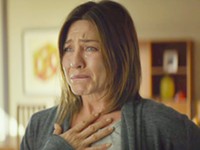
Film Review: "Cake"
Jan 26, 2015 -
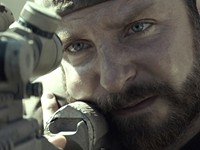
Film Review: "American Sniper"
Jan 19, 2015 -
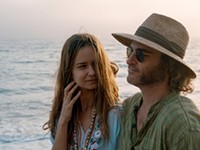
Film Review: "Inherent Vice"
Jan 12, 2015 - More »
